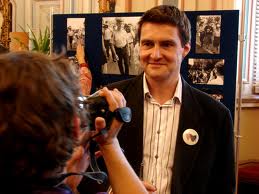 The following piece was written by AME Campaign Director, Rodney Croome AM, and first appeared on ABC The Drum.
The following piece was written by AME Campaign Director, Rodney Croome AM, and first appeared on ABC The Drum.
Click here to read the Hansard of the debate on the Tasmanian marriage motion.
**
Tasmania has become the first Australian state to officially endorse the idea that same-sex couples be allowed to legally marry.
On Wednesday the Lower House of State Parliament passed a Greens motion in favour of marriage equality thanks to unanimous support from the Labor Party. The motion called on the Federal Government to amend the Marriage Act to allow same-sex couples to marry.
The passage of the motion sends a strong message to the Federal Government that it is increasingly out of step, as well as a message of hope to same-sex couples and their families that reform is coming and is unstoppable.
My more immediate hope is that other state and territory parliaments will follow Tasmania’s lead to magnify the message.
The motion also packs a punch because it has some unlikely supporters and comes from what George Negus described as “the most unlikely state”.
Only last week Tasmania’s world champion axeman and self-described “old-fashioned bushie”, David Foster, came out as a supporter of marriage equality while some of the most compelling speeches in favour of marriage equality were from Labor MPs with strong religious convictions or rough-and-ready blue-collar backgrounds (not surprisingly, the Liberals sat silent and friendless as their leader tried and failed to explain their increasingly isolated stance against marriage equality).
What George Negus meant about Tasmania as a whole being “unlikely” is that it was the last state to decriminalise homosexuality in 1997.
Many continental Australians would agree it is ironic their island cousins are leading the way on legally recognising same-sex relationships given our reluctance to decriminalise these relationships.
But for me there’s no irony or inconsistency at all.
Tasmania is leading on marriage equality not despite our past but because of it.
The debate about decriminalising homosexuality in Tasmania was the most divisive, bitter and damaging of its kind in Australian history.
It involved the mass arrests of gay rights supporters, large anti-gay rallies, and the mobilisation of thousands of people on both sides.
Over nine years five bills were angrily rejected in the state’s Upper House with MPs calling for gays to be “tracked down and wiped out”.
The United Nations, the Federal Government and the High Court were drawn into the fight.
There was even a national boycott of Tasmanian products.
Our reputation for bigotry was deeply embarrassing for many Tasmanians and was held partly responsible by prominent economists for a decline in tourism, immigration and investment.
Worse, families and communities were torn apart by the issue.
Some families will always be scarred by the gay law reform debate because the hatred was too much for some young Tasmanians to bear and they took their own lives.
All the Labor MPs who spoke so movingly in favour of equality during Wednesday’s debate lived through our dark past and almost all referenced it.
They all witnessed the immense pain and trauma caused by discriminatory laws and the prejudice that feeds off them.
They all heard, ad nauseam, the hysterical fear-mongering that seems to accompany every attempt to provide same-sex attracted people with respect and equality.
They have all seen, first-hand, how these fears came to nothing and how Tasmania has benefited from becoming a more inclusive, accepting and diverse society.
It is thanks to these experiences that the Tasmanian Parliament has been at the forefront of the movement for equality ever since homosexuality was finally decriminalised in 1997.
When that particular dam burst, out flowed the nation’s best anti-discrimination laws (1999), its first civil partnership scheme (2003), its first attempt at state same-sex marriage laws (2005 and 2008), and its first laws recognising overseas same-sex marriages (2010).
On top of this, the Tasmanian Labor State Conference was the first in Australia to endorse marriage equality in 2009 and the first to do it twice in 2011.
When seen in the context of our fraught past and our more recent attempts to make amends for that past, Wednesday’s endorsement of marriage equality makes perfect sense.
It is the logical step for a society that has learnt the hard way why removing discrimination against same-sex-attracted people is important, and now values inclusion and equality more profoundly than most.
The lessons for federal MPs couldn’t be clearer.
Don’t make the mistake Tasmania made of unnecessarily prolonging a divisive debate that gives prejudice a voice, and of resisting an inevitable change to the detriment of the nation’s reputation.
Don’t listen to the fear-mongers who predict the world will end when we know from the overseas experience reform will have a positive impact.
Don’t sideline equality because there are “more important” (read “easier”) issues to deal with, and don’t beat up on it for tawdry political gain when there are real people with real lives and real families at stake.
Most of all, don’t underestimate the value to Australia as a whole of providing equity and respect for same-sex couples and their families.
Listen to the heart-shaped island at the bottom of the world.
It is telling you that prejudice hurts us all, that equality really matters and that love remains the greatest force for good in the life of every one of us.
Rodney Croome AM, is an honorary lecturer in sociology at the University of Tasmania.
